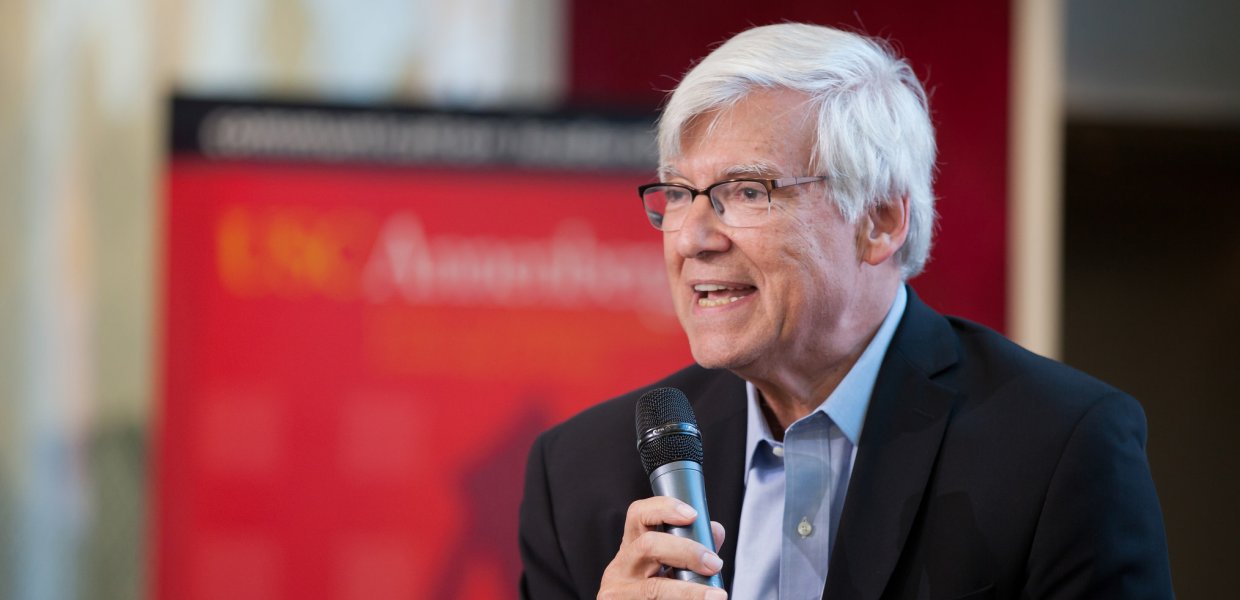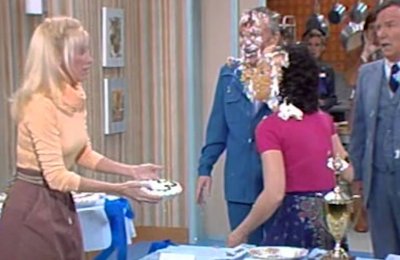Inside the classrooms at USC Annenberg, students are the ones typically tasked with answering the hard hitting questions. "Five Minutes with..." turns the table on faculty members to ask them the questions we've been itching to know the answers to.
Given his roles as a USC Annenberg professor of communication, director of the Center on Communication Leadership and Policy, and president of the Annenberg Foundation Trust at Sunnylands, it isn't a wonder that professor Geoffrey Cowan's latest book, Let the People Rule: Theodore Roosevelt and the Birth of the Presidential Primary, took a little longer to write than expected. The January release date of the book, which tells of Roosevelt's unsuccessful 1912 presidential campaign and role in initiating state primaries, turned out to be perfectly timed, however, given the political atmosphere in the run up to the 2016 presidential election.
More than a century after his last bid for president, Roosevelt's political contributions continue to shape elections today, in large part by allowing candidates who aren't party insiders ― namely Bernie Sanders and Donald Trump ― to find zealous support for their presidential campaigns. This was among the many points Cowan delved into while discussing the book with a full house of attendees at a recent Zócalo Public Square event, “Do Primaries Really Make Presidential Elections More Democratic?” at the Museum of Contemporary Art on Jan. 15.
USC Annenberg sat down with Cowan to discuss the event, the making of "Let the People Rule," and the relevance of Roosevelt's politics today.
How did you become interested in writing about Theodore Roosevelt and the birth of the presidential primary?
I was inspired by the fact that I had been involved with party reform myself [as a student at Yale Law School] in 1968, and I had at that time been fascinated by the story of what Roosevelt had done. He was kind of a role model to me in that way, and it was a story I had always wanted to really understand better, so I had been interested in it since 1968. Twenty-five years ago when I finished my last book, which was called "The People v. Clarence Darrow: The Bribery Trial of America’s Greatest Lawyer," I thought this would be my next book, but then things intervened. I wound up running [the international broadcasting service] Voice of America, and being the Dean here. So when I stepped down as Dean, which is I guess a little more than eight years ago, I was anticipating that this would be a great project to research and write. So it’s been about nine years. I worked on getting a lot of research ― a lot of it’s really fresh ― for about five years, and then I became head of Sunnylands, and when I took on that job I had to find the time from somewhere. So I for three years put the book to the side and went back to it in the last couple years because I wanted it to come out in this election cycle.
So much has been written about Theodore Roosevelt, but you were able to find a lot of new material for the book. What was your research process like?
One thing that’s really fun about research, I think ― and I love to see students get inspired by this, and it's something I didn’t understand as an undergraduate by the way ― is that what makes research so interesting is what I call time travel. You’re touching documents no one’s ever touched before, except for the principals, and you’re seeing a new way in. So what I did was to discover a lot of new material that no one’s ever seen before, and a lot of it was really fun. One of the characters in my book is named Ormsby McHarg, I think Iike him partly because of his name. He was a very, very interesting character who kind of ran Roosevelt’s campaign for a while, but Roosevelt denied that he was running it. He at one time talked about how dangerous Roosevelt was, and another time he supported him, but now he’s running his campaign. As with all of the people I’m writing about, secondary figures, I want to find their letters. If I can find their letters, it’s like I’ll have the inside oral history, and especially letters no one’s ever seen before.
So thanks to the internet, late at night I’m prowling around on Ancestry.com or something, to see if anybody has anything to say about Ormsby McHard, and I find this posting from somebody who says if anybody has any letters from or interest in Ormsby McHarg, let me know. So it was probably from two years earlier, and he has his email there, so I sent him an email and said, “I’m writing a book featuring Ormsby McHarg, if you have any letters or anything to share that would be great, I’ll share with you what I know.” Then I don’t hear from this person for almost a year. A year later, something prompts me to send him another email: "You may have missed my first one." He gets back to me: "Sorry I missed your first email, my name is Paul Ryan, I’m Ormsby McHarg’s grandson, and I have all of Ormbsy McHarg’s papers," which he’s never shared with anybody. So I say, if you could give me any papers you have from this period of time, that would be great. So he made photocopies, and they give a whole different perspective on the story because I now have Ormsby McHarg’s letters. Last week when I was in New York giving a book talk, Paul Ryan was there, and we met in person for the first time.
There are many stories like that. I’m going to give a talk at the Portsmouth Athenaeum in New Hampshire [before the primary.] In my crazy quest to find stuff that’s never been seen before, the papers of another person in Roosevelt’s life, a young lawyer who becomes an important part of the campaign, are in the Portsmouth Athenaeum, and I don’t think anybody’s ever used them before. So, I arranged for the librarian of the Portsmouth Athenaeum to photocopy all the letters that are relevant, which he sent to me. And this young man, whose name is Arthur Hill, was inside some incredible moments with TR, writes gossipy letters with mother about those scenes, and I have those letters. There are many things like that that I found that no one’s ever seen before and give an entirely fresh view of this person and this race.
Why was it important to you that Let the People Rule be released during an election cycle?
What I hoped was was that in a presidential year, during which there are primaries in both parties, which maybe happens every eight years so it’s a special moment, that in that kind of year, there would be some resonance as to how it all started, and it turns out there’s a lot of overlap. I wish people wanted to talk more about 1912, because that’s what I want to talk about, I really do. To me it’s such a great story, but people want to talk about comparing it to now. I just did Tavis Smiley’s show, and what he’s interested in is, yes then, but basically now, what are the lessons, what should we do differently with the primary system, et cetera.
What made the Zócalo Public Square event such a successful platform to discuss the book?
I love Gregory Rodriguez, who runs [Zócalo Public Square.] Gregory has been at two retreats that we’ve done at Sunnylands and he is himself a journalist, and I admire his work a lot. They have a constituency, they’re interested in community and Los Angeles, and part of my story is a California story, so when I’ve talked about it at private events in California, as opposed to a public one like this, I drop the California story, which is a really interesting one and is a lot of fun. But I have a little piece in my talk with hiring Johnson and his rowdy Californians, "Those 26 delegates are mine," so that’s all part of it, but it goes into a much richer California story when you want it to. But I like that they are based here, they’re really interested in community.
What was your biggest takeaway from writing Let the People Rule?
There are many things that have never been told before, but the shocking thing is [Roosevelt's] decision at the end [of his campaign] to exclude the black delegates, and many people have asked me how that makes me feel about him. I think, for me, the most amazing thing was digging into that story. And part of what will be interesting in my book tour is that at a couple of the talks there will be descendants of those people there. It’s one thing to be Ormbsy McHarg’s grandson, but at another of my talks Theodore Roosevelt’s great grandson was there. It’s also amazing to go places where there are descendants of these people who weren’t allowed into the convention, and they’re really impressive, so that’s a part of the story that I think is fascinating, too.
This interview has been edited for length and clarity.






